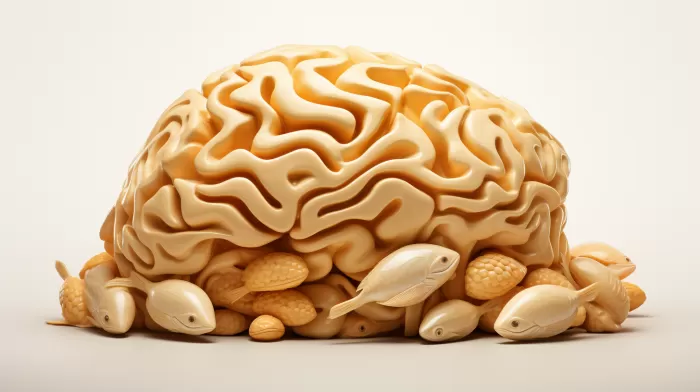Your brain is primarily composed of fat, and for optimal brain health, it’s crucial to fuel it with the right type of fat. The consumption of fish fat, specifically long-chain omega-3 polyunsaturated fatty acids, has been shown to promote better brain health and function. A study called the Cardiovascular Health Study in the U.S. examined the health records of over 3,500 Americans aged 65 and older. The findings revealed that individuals with higher amounts of fish fat in their bloodstream were more protected from brain infarcts and other age-related brain abnormalities.
The Importance of Omega-3
Omega-3 fatty acids are essential nutrients that our bodies cannot produce on their own. These substances help reduce inflammation, boost brain function and even improve heart health. The two most essential types of omega-3 fatty acids are eicosapentaenoic acid (EPA) and docosahexaenoic acid (DHA), both of which are commonly found in fish oils. In fact, EPA and DHA are the specific fatty acids that have been shown to possess neuroprotective properties.
The study discovered that individuals with high levels of long-chain omega-3 polyunsaturated fatty acids in their bloodstream had a roughly 40 percent decreased risk of experiencing small brain infarcts compared to those with lower levels of these essential fats. Additionally, the research demonstrated that people with high omega-3 content in their blood had comparatively fewer detrimental changes to their brain’s white matter.
Silent Brain Infarcts
Brain infarcts are primarily dead tissue areas that result from the interruption of blood supply. Silent brain infarcts, which often go unnoticed, can only be discovered via brain scans.
Approximately 20 percent of older adults who are otherwise healthy may have silent brain infarcts, which can potentially lead to cognitive decline and even dementia. Thus, a diet high in omega-3s can greatly benefit older adults in maintaining their cognitive health.
The Benefits of Fish Oil
There are several ways to incorporate more fish oil into one’s diet for improved brain health:
- Eat more fish: Consuming fish, particularly fatty varieties such as salmon, mackerel, and sardines, is the best way to increase long-chain omega-3 polyunsaturated fatty acids in your diet. Aim to eat at least two or three servings of fish per week.
-
Take supplements: Fish oil is available in supplement form, making it easy to incorporate into one’s daily routine. Choose a high-quality product that has been tested for purity and potency.
-
Incorporate plant-based omega-3s: While they don’t pack the same punch as marine-based sources, plant-based sources of omega-3 fatty acids are still beneficial. Foods like flaxseeds, chia seeds, and walnuts can be an excellent addition to anyone’s diet.
-
Prioritize quality: Oftentimes, finances and personal preferences may limit one’s seafood intake. In such cases, individuals should consider adding high-quality omega-3 supplements to their diets. It is important to note though that these supplements are not intended to replace a balanced and nutritious diet, but rather to complement it.
Additionally, individuals should consider consulting their doctor or nutritionist first, as every person’s nutritional needs can vary significantly. Pregnant women, breastfeeding mothers, and those on certain medications or with specific health conditions should be especially cautious.
A Holistic Approach to Brain Health
While consuming an adequate amount of fish fats and omega-3s is essential for optimal brain health, it’s also crucial to adopt a well-rounded, healthy lifestyle involving a balanced diet, regular exercise, stress management and good sleep hygiene. These factors can all contribute to better overall cognitive function and ability.
By incorporating long-chain omega-3 polyunsaturated fatty acids into your diet and promoting a healthy lifestyle, you can help protect your brain from age-related decline and enjoy a better quality of life as you age. Remember, the choices you make now can have a significant impact on your cognitive health in the future.



